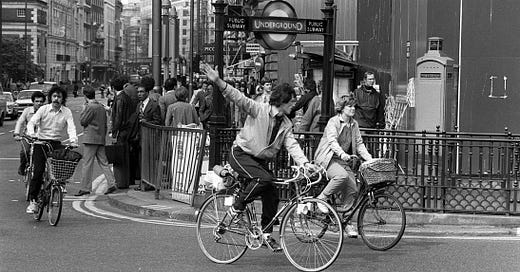Hello and welcome to Oversharing, a newsletter about the proverbial sharing economy.
In case you missed the big news: Oversharing is now a subscriber-supported newsletter. As of this week, you can purchase a subscription to Oversharing for a special launch period rate of $7 a month or $70 a year. Paid subscribers get three posts a week, the ability to comment and participate (kindly! respectfully!) in community threads, and access to the full Oversharing archive. Everything will be free for the first couple of weeks. After that, there will be one free issue of Oversharing each week, with the rest available to paid members.
Yesterday I said I’d share more about what I was up to for the past two years. In the first year of the pandemic I lost my staff job at Quartz, and with it my U.K. visa. This was, to put it mildly, a bad position to be in. I’d only recently moved to London, plus I was worried about the prospect of having to move back to the U.S. during a global pandemic—this was when we still didn’t know much about how covid spread, and the prevailing advice was to stay put. I decided I needed a new visa that would keep me in London for at least a year; to get it, I went to grad school.
The course I did was called Sustainable Cities, a sort of urban planning-lite. Cities were a central theme of my reporting on the sharing economy. Writing about companies like Uber, Airbnb, and DoorDash meant thinking about how people and things move around dense urban areas; how assets can be shared and repurposed for a more sustainable future; and who really owns public space. Sharing economy startups consistently touched and reshaped the urban fabric, whether though transport, logistics, housing, or shared office space.
The program offered a useful framework for these ideas. I read a classic paper by geographer David Harvey positing that public-private partnerships in the U.S. often amounted to “a subsidy for affluent consumers” and, along with urban entrepreneurialism, contributed “to increasing disparities in wealth and income.” Harvey wrote that in 1989, but I thought of how venture capital subsidies to companies like Uber had trickled down to affluent consumers while simultaneously helping to upend entire industries and livelihoods. I took a class on tourism and development that offered new ways of thinking about home-rental startups like Airbnb and the tensions that simmer when a residential neighborhood becomes a tourist hotspot. I read so much Lefebvre. I wrote a dissertation on how New York City pedestrianized streets during the pandemic through its Open Streets program, and what that meant for access to public space and the pursuit of environmental justice.
My year back at school was less a detour than a sabbatical, a time to think about the sharing economy and urban theory without imminent deadlines. It was nice to have that space after years of working in the time-pressured environment of a newsroom.
My hope is to bring this perspective to Oversharing going forward, both for a richer interrogation (a favorite grad school word) of the sharing economy and to look more broadly at how technology is reshaping the urban fabric. I’m thinking about the role of micromobility in sustainable transportation; the boom in ‘instant’ delivery; ‘sharing’ technologies in a post-covid world; and the 15-minute city. If you’re an urban theory nerd or working on tech with urban applications, please reach out, I’d love to speak with you. Reply to this email or reach me at oversharingstuff@gmail.com.
I’m sharing below a short list of favorite readings from the program, in case anyone is interested. I’m really excited to add a new layer to Oversharing, and hope you are too. Once again, please share this newsletter widely and please consider subscribing.
Favorite readings on sustainable cities:
A Ladder of Citizen Participation (Sherry Arnstein, 1969)
From “streets for traffic” to “streets for people”: can street experiments transform urban mobility? (Luca Bertolini, 2020)
Interrogating urban experiments (Federico Caprotti and Robert Cowley, 2016)
The Power Broker (Robert Caro, 1975)
A Place for Stories: Nature, History, and Narrative (William Cronon, 1992)
Do-It-Yourself Urban Design: The Social Practice of Informal “Improvement” Through Unauthorized Alteration (Gordon Douglas, 2013)
DIY urbanism: implications for cities (Donovan Finn, 2014)
From Managerialism to Entrepreneurialism: The Transformation in Urban Governance in Late Capitalism (David Harvey, 1989)
Happy City: Transforming Our Lives Through Urban Design (Charles Montgomery, 2013)
Urban green space, public health, and environmental justice: The challenge of making cities ‘just green enough’ (Jennifer Wolch, Jason Byrne, and Joshua Newell, 2014)
Naked City: The Death and Life of Authentic Urban Places (Sharon Zukin, 2009)





is your dissertation open to read?